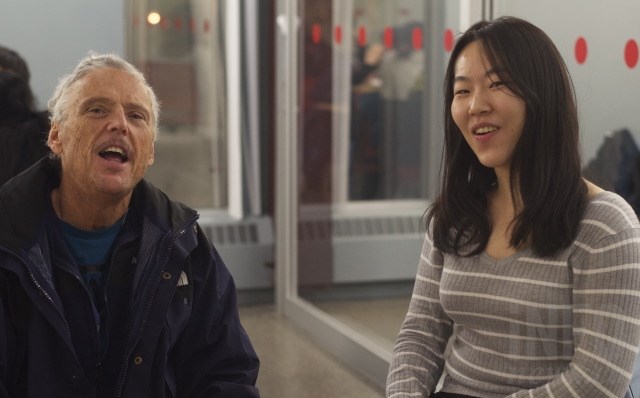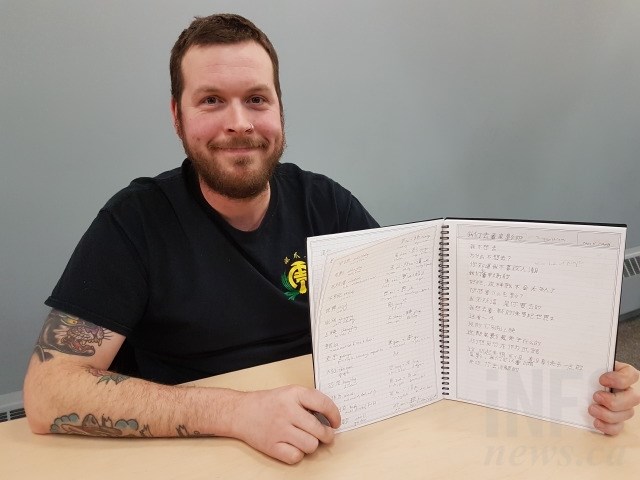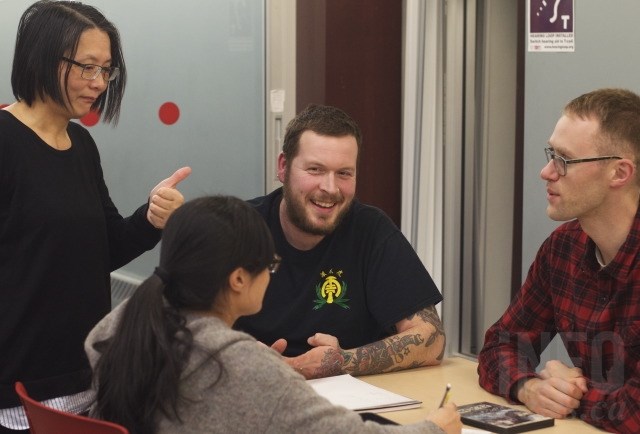
Mike Love and Xiaochen Yang (Rose) sit down for a chat at Mandarin Mondays in Kelowna, Monday, Jan. 21, 2019.
(CHARLOTTE HELSTON - REPORTER / iNFOnews.ca)
January 24, 2019 - 6:30 PM
KELOWNA - Adopted from China when they were babies, sisters Jamie and Kate Fisher never spoke the language of their birth place while growing up in Kelowna. Now 16 and 19 years old, the siblings have decided to learn Mandarin — along with their dad and younger brother.
“We would like to go back to China at some point and would like to learn (Mandarin) so that we can speak to people in China, because they probably don’t speak very much English,” Kate says.
The Fishers are just a handful of a much larger group of Kelowna residents who gather once a week at the Kelowna Library for Mandarin Mondays, a free conversation club where Mandarin-speaking volunteers — many of them newly landed immigrants — share the ins and outs of what is widely considered to be among the world’s most difficult languages to learn. It is also the most spoken language on the planet.
Mandarin Mondays have been running weekly at the library for about a year. This week, a large group of English and Mandarin speakers spill into a roomy conference room (and later into the common areas) to chat with each other. They are high school students, immigrants (some of whom were teachers in their home countries), people who long to travel to China, business owners, and as the sessions go on, many are becoming close friends, club founder Marriana Chen says.
Chen, a teacher, immigrated to Canada in 2010 with her family and eventually settled in Kelowna where she now works for KCR Immigrant Services.

Luke Mortenson likens written Mandarin (which uses symbolic characters instead of individual alphabetic letter sounds, like English) to "a string of emojis." He says "the symbols add up to a big idea but they also mean something on their own."
(CHARLOTTE HELSTON - REPORTER / iNFOnews.ca)
“Each year I see clients and they all have the same problem I had: low confidence. They feel like ‘I cannot speak English, I cannot do anything,’” Chen says.
On the contrary, Chen says, they can do a lot — including teach Mandarin. She got the idea to connect her Mandarin-speaking clients with English speakers after discovering Spanish Tuesdays and the English Corner on Wednesdays at the Kelowna Library. She knew there were lots of Chinese speakers who would be interested in participating, but she wasn’t sure how many Kelowna residents would want to learn Mandarin.
As it turns out, there are quite a lot. The current list of Mandarin learners — 50 — has surpassed the number of Mandarin-speaking volunteers, which sits at 21. Roughly half of the Mandarin learners were born in Canada, with the rest hailing from places like Germany, Indonesia, the Philippines, Saudi Arabia, Korea, Japan and Switzerland, Chen says.
According to the 2016 census from Statistics Canada, roughly 408,000 people in B.C. speak Chinese languages. In Kelowna, just over 1,200 people reported a Chinese language as their mother tongue. Anecdotally, Chen says she’s seen an influx of Chinese immigrants in recent years. It’s too expensive in the Lower Mainland, and too cold in Alberta, she says, so many Chinese immigrants are moving to the Okanagan.
It seems that every English speaker in the club has a unique story and reason for wanting to learn Mandarin. For Mike Love, the reason is, in part, health related.

Marriana Chen, left, checks in on Mandarin language learners Luke Mortenson, centre, and Brendan Ferguson.
(CHARLOTTE HELSTON - REPORTER / iNFOnews.ca)
“I had dementia last year and one of the ways I got rid of it is learning languages. It’s making my hippocampus bigger,” he says.
The bonus, he says, is having interesting conversations and meeting new people.
Luke Mortenson was already trying to learn Mandarin on his own before discovering the club last year.
“It just seemed like a billion people speak this language, so that’s probably a good bet for the future,” he says.
He’s open to the idea of using his language skills for work one day, perhaps as a translator, but for now, he’d be happy to visit China and be able to carry on a conversation.
“The first day I came to the club I was pretty scared,” he says. “You have to be ready to embarrass yourself and you have to be ready to make mistakes.”
But a little effort — mistakes and all — go a long way to making Kelowna feel welcoming for newcomers.
Xiaochen Yang, who goes by Rose, came from China to Canada last year and says it’s heartwarming to see Kelowna residents wanting to learn her language.
“I feel so surprised because people here are so enthusiastic and they have a passion to learn Chinese,” she says.
Back in China, Yang majored in English and Tourism, so her English speaking skills are already pretty impressive. Her biggest challenge? Understanding the humour in English jokes.
“Sometimes I can’t understand them because of the differences in culture,” she says.
Fortunately, she’s paired up to chat with Mike Love who, in addition to learning an array of languages, is also a comedian. He rattles off a series of words in Mandarin and earns a chuckle from Yang.
Looking around the room, there are many others smiling and giggling at their own conversations, jokes, and awkward stumblings into a foreign language. Despite their differences in speech, there’s one thing that needs no translation: laughter.
Go here for more information about Mandarin Mondays.
To contact a reporter for this story, email Charlotte Helston or call 250-309-5230 or email the editor. You can also submit photos, videos or news tips to the newsroom and be entered to win a monthly prize draw.
We welcome your comments and opinions on our stories but play nice. We won't censor or delete comments unless they contain off-topic statements or links, unnecessary vulgarity, false facts, spam or obviously fake profiles. If you have any concerns about what you see in comments, email the editor in the link above.
News from © iNFOnews, 2019